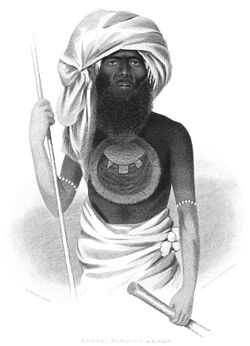Tanoa Visawaqa

Ratu Tanoa Visawaqa (pronounced [βisaː'ɰaːŋɡa]) was a Fijian Chieftain who held the title Vunivalu of Bau. With Adi Savusavu, one of his nine wives, he was the father of Seru Epenisa Cakobau, who succeeded in unifying Fiji into a single kingdom.
Installation
The son of Ratu Banuve Baleivavalagi and father of the first Tui Viti, Ratu Seru Epenisa Cakobau, Ratu Tanoa was installed as Vunivalu upon the death of his elder brother Ratu Naulivou Ramatenikutu, who was involved in a fierce power struggle against the Roko Tui Bau, Ratu Raiwalui, which led to his death.
The idea of a Tui Viti was conceived in the Rule of Tanoa but saw fruition in the reign of his son Seru.
The Wars of Bau
As the animosity intensified, Ratu Tanoa was forced into exile, firstly on Koro Island and then in Somosomo on Taveuni, where he remained until his son, Ratu Seru Cakobau led a coup in 1837, reinstalling his father as Vunivalu until his death in 1852, whereupon Cakobau inherited the title. He had 9 wives; amongst his issue were Ratu Tubuanakoro and Ratu Seru Epenisa Cakobau.
The Burner of Boats
It was before his exile that Tanoa was named Tanoa "Visawaqa" for his bloody campaign and slaying of the Roko Tui Bau, Ratu Raiwalui, he set fire to the War Canoes of the warriors of the Roko Tui Bau, and was thereafter called Tanoa "Burner of boats" or figuratively "excessive killer", even though Ratu Naulivou sent his brother Tanoa on the mission to punish the Roko Tui Bau and his followers he did not expect the bloodbath that would follow and Tanoa's actions greatly worried his brother.
| Preceded by Ratu Naulivou Ramatenikutu |
Vunivalu of Bau (1st Term) 1829–1832 |
Succeeded by Navuaka Komainaqaranikula Tui Veikoso |
| Preceded by Navuaka Komainaqaranikula Tui Veikoso |
Vunivalu of Bau (2nd Term) 1837–1852 |
Succeeded by Ratu Seru Epenisa Cakobau |
References
- The Majesty of Colour: A Life of Sir John Bates Thurston - Page 44, by Scarr, Deryck - 1980, reference to Tanoa Visawaqa, his exile and restoration by his son seru.
- Apologies To Thucydides: Understanding History as Culture and Vice Versa - Page 249, by Marshall David Sahlins, reference to Tanoa and how his name came about.
- Fiji Handbook of the Colony: Special Wartime Issue - Page 77, by Leonard G Usher - 1943, Original from the University of Michigan. numerous references to Ratu Tanoa along with various details of his life and conquests
External links
- Vunivalu
- Museum of Victoria with picture of and reference to Ratu Tanoa Visawaqa